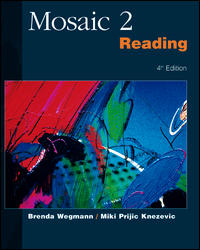

 Mosaic 2 Reading, 4/e Conflict and Reconciliation Identifying the Author's Opinion |
 2003 McGraw-Hill Higher Education
2003 McGraw-Hill Higher EducationAny use is subject to the Terms of Use and Privacy Policy.
McGraw-Hill Higher Education is one of the many fine businesses of The McGraw-Hill Companies.